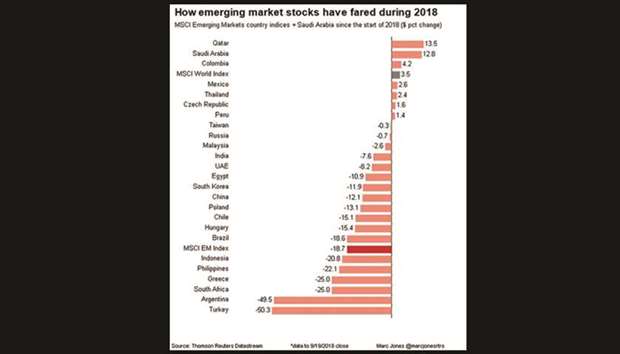Emerging market bargain hunters were out in force yesterday, snapping up beaten up currencies from South Africa to Russia and driving the main global EM stocks index to a three-week high.
The escalating trade war between the world’s biggest developing economy China and the biggest full stop, the United States, again failed to dampen the mood as animal spirits returned.
There were still some sore wounds.
Turkey’s lira traded higher until the government’s long-awaited economic plan failed to impress. That compounded data showing consumer confidence had slumped to a 3-year low.
South Africa’s rand, another heavyweight EM currency battered in recent months, was up 1.5% at 14.45 per dollar as markets geared up for a 1300 GMT central bank interest rate decision, and after the government said it had approved a new mining charter.
All bar one of the economists polled by Reuters see the Reserve Bank keeping its benchmark rate at 6.5%, with the need to keep inflation in check following the rand’s recent plunge.
Russia’s rouble was also on the front foot, hitting a five-week high as oil prices consolidated their recent gains.
“There is definitely some bargain hunting going on but it is a little bit selective,” said ING’s chief EMEA FX and interest rate strategist, Petr Krpata.
“The main currencies that are up are the ones that were absolutely hammered last month... we think it is still too early to declare more stable risk sentiment, particularly ahead of the US mid-term elections (in November).”
There was plenty of appetite for stocks as well, although there was some divergence there too.
China’s main bourses ended flat and Manila, Jakarta, Mumbai and Taiwan had dropped between 0.2% and 1.2% in Asia.
Turkish stocks also flopped after country’s economic plan.
But solid gains elsewhere, including in Russia and South Africa put MSCI’s 24-country emerging market index firmly on course for its third day of gains.
Regional Asia currencies also were propped up by China Premier’s Li Keqiang’s comments on Wednesday that Beijing will not weaken the yuan to boost exports.
Washington earlier this week imposed 10% tariffs on about $200bn worth of Chinese imports, while Beijing announced new retaliatory levies on about $60bn worth of US goods at scaled-back rates.
The Indonesian rupiah and Philippine peso both climbed nearly 0.2%, drawing comfort from their governments’ proposed measures to shore up their currencies.
The Philippine central bank signalled a fourth hike in its benchmark interest rates this year on Tuesday, while the Indonesian finance minister said the government is aiming to persuade exporters to keep their earnings onshore and convert them into local currency.

